
Relatives of Indian nurse Nimisha Priya are urgently seeking to commute her death sentence in Yemen, where she faces execution on Wednesday. Priya was sentenced to death in 2020 for the murder of her former business partner, a Yemeni national, whose body was discovered in a water tank in 2017. The case has captured significant media attention in India, prompting calls for intervention from government officials and human rights organizations.
Priya’s death sentence was handed down by a court in the capital city, Sanaa. Since then, her family has been advocating for her release, complicated by the absence of formal diplomatic relations between New Delhi and the Houthis, who have governed Sanaa since the civil war erupted in 2014. As her execution date approaches, Amnesty International has urged the Houthis to halt the execution and establish a moratorium on all death sentences. The organization described the death penalty as “the ultimate cruel, inhuman and degrading punishment.”
In Yemen, Islamic law allows for clemency if the victim’s family pardons the accused and accepts “diyah,” or blood money. Samuel Joseph, a social worker assisting Priya’s family, expressed cautious optimism about the possibility of clemency. “I am optimistic. I’m spiriting the efforts here, and by god’s grace, we got people who are helping,” he told CNN. Joseph noted that Priya allegedly administered a fatal overdose of sedatives to her business partner, but her family contends she acted in self-defense against an abusive relationship.
The legal proceedings against Priya were conducted in Arabic without the provision of a translator, raising concerns about the fairness of her trial. A group of activists and lawyers formed the Save Nimisha Priya Action Council in 2020 to raise funds for her legal defense and negotiate with the victim’s family. According to council member Rafeeq Ravuthar, approximately five million rupees (nearly $58,000) has been raised for Priya’s defense, but negotiations have been arduous due to the lack of an Indian embassy in Yemen.
Politicians from Priya’s home state of Kerala have also urged intervention from India’s Prime Minister Narendra Modi. Chief Minister Pinarayi Vijayan wrote to Modi, emphasizing the need for compassion in this case. “Considering the fact this is a case deserving sympathy, I appeal to the Hon’ble Prime Minister to take up the matter,” Vijayan stated.
The Indian government has indicated its commitment to supporting citizens in distress abroad. In February, Kirti Vardhan Singh, India’s Minister of State for External Affairs, affirmed that the government prioritizes the welfare of Indians overseas. He stated, “The Government of India is providing all possible assistance in the case.” However, he also noted that any resolution regarding Priya’s situation rests between the families involved.
Priya moved to Yemen in 2008, joining over two million people from Kerala seeking better opportunities in the Middle East. She initially worked as a nurse, aspiring to establish her own clinic to secure a future for her young daughter and husband, Tomy Thomas. In 2014, with the financial backing of her husband, she opened a clinic in Sanaa, but her dreams were soon overshadowed by escalating political conflict.
The situation in Yemen deteriorated significantly when Houthi rebels seized control of the capital, leading to a civil war that has decimated the country’s infrastructure and safety. While many foreign nationals chose to evacuate, Priya remained, determined to protect the life she had built.
The lack of formal diplomatic relations between India and the Houthis presents additional challenges for those advocating for Priya’s release. Currently, all diplomatic efforts regarding Yemen are managed through the Indian Embassy in Djibouti, across the Red Sea, complicating communication and assistance efforts.
According to Amnesty International, Yemen ranked among the top five countries with the highest execution rates in 2024. While the organization confirmed at least one execution carried out by the Houthis in their territory this year, it acknowledged that the actual number may be higher.
Priya’s mother, who works as a domestic laborer in Kerala, has sold her home to fund her daughter’s legal fees and has been in Yemen for over a year to facilitate negotiations for her release. Meanwhile, Priya’s husband and daughter remain in Kerala, holding onto hope for her safety. “My wife is very good, she is very loving,” said Thomas. “That is the sole reason I am with her, supporting her and will do so till the end.”
As the deadline for Priya’s execution draws near, her family, activists, and supporters continue to rally for her freedom, navigating a complex landscape of legal, diplomatic, and humanitarian challenges.







